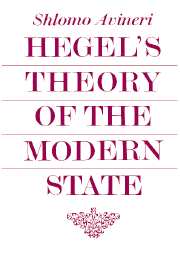Book contents
- Frontmatter
- Contents
- Title in the Series
- Preface
- 1 Beginnings
- 2 Positivity and Freedom
- 3 The Modernization of Germany
- 4 The New Era
- 5 Modern Life and Social Reality
- 6 The Owl of Minerva and the Critical Mind
- 7 The Political Economy of Modern Society
- 8 Social Classes, Representation and Pluralism
- 9 The State – the Consciousness of Freedom
- 10 War
- 11 The English Reform Bill – the Social Problem Again
- 12 History – the Progress towards the Consciousness of Freedom
- Epilogue
- Bibliography
- Index
Epilogue
Published online by Cambridge University Press: 05 June 2012
- Frontmatter
- Contents
- Title in the Series
- Preface
- 1 Beginnings
- 2 Positivity and Freedom
- 3 The Modernization of Germany
- 4 The New Era
- 5 Modern Life and Social Reality
- 6 The Owl of Minerva and the Critical Mind
- 7 The Political Economy of Modern Society
- 8 Social Classes, Representation and Pluralism
- 9 The State – the Consciousness of Freedom
- 10 War
- 11 The English Reform Bill – the Social Problem Again
- 12 History – the Progress towards the Consciousness of Freedom
- Epilogue
- Bibliography
- Index
Summary
Nothing could better express the prejudices and ignorance connected with Hegelian political philosophy in English-speaking countries than the following statement by Bertrand Russell:
It follows from his metaphysics that true liberty consists in obedience to an arbitrary authority, that free speech is an evil, that absolute monarchy is good, that the Prussian state was the best existing at the time when he wrote, that war is good, and that an international organization for the peaceful settlement of disputes would be a misfortune … What he admired were … order, system, regulation and intensity of governmental control.
Labouring under such enormous prejudices, it is not easy to restore a more balanced view of Hegel's political thought. What we have tried to bring out in our discussion is not only how false such a view as expressed by Russell is, but also that Hegel has to be seen as the first major modern political philosopher who attempted to confront the realities of the modern age. While many among eighteenth-century philosophers undoubtedly helped to shape the emergent modern world, their basically a-historical approach made them incapable of facing the challenges of the new society; and Rousseau, who deeply sensed this inadequacy of the philosophes and perceived the novelty of his age, retreated in disgust from what the new world had to offer to man.
- Type
- Chapter
- Information
- Hegel's Theory of the Modern State , pp. 239 - 241Publisher: Cambridge University PressPrint publication year: 1972
- 1
- Cited by

